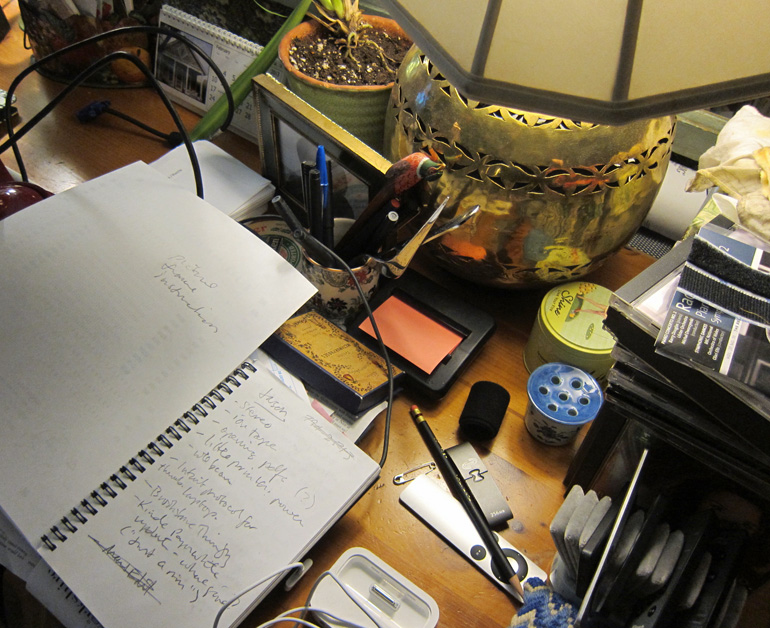Gotham Diary:
Working House
12 February 2013
When did I stop playing house? When I lost the inability to see through closet and cabinet doors. When I could still pretend that visible order authorized hidden confusion. When I no longer viewed my habitation as if I were the photo editor of a shelter magazine. That’s when I stopped playing house; that’s when I began working house.
A working household is everything at once: refuge, workplace, tea room, gallery, wardrobe. (Once upon a time, it was also a farm; now it might include a garden.)Â It is an expression of the person who runs it, visible as it may be to visitors.
The household is a unit, and this is new. Until now, pernicious distinctions have been made between the different parts of the home, each addressed by specialists in that area, be it cooking, sewing, decorating, designing, cleaning, or managing clothes and personal hygiene. At the back of those distinctions stood the ghosts of servants, men and women assigned to work in the various departments of the stately homes of the wealthy. Such specialization is now neither possible nor desirable. There are no servants, and, as appliances become ever more sophisticated, there is less and less need for them. Nor ought householders act like their own servants, running their kitchens as if they were cooks (trained in “home economics”) or cleaning their bathrooms as if they were janitors. Yes, meals must be prepared and toilets kept clean, but the work is not to be approached as if by a “specialist” — someone whose job it is to do such things. There are no specialties in householding. The householder must do everything. And I ought to know: I’m the compleat householder, a reader and writer who works at home.
I could argue that reading and writing are more important than cooking or cleaning. You would have to agree with me, because if it were not for my writing and your reading you would not be aware of this problem of mine — which I am trying to transform into something that is not a problem. Certainly a man in my socio-economic position, relatively speaking, would not have been expected to think about cooking and cleaning a century or even fifty years ago. The demarcation between the life of the mind and the drudgery of the mop was clear to everyone, and the worlds were as separated as castes.
(Somewhat awkwardly, I must acknowledge the very different, and thoroughly mixed — demarcation-free — experience of women who would be in my position but for the want of a Y chromosome. Such women have been my inspiration: “having at all” is a more realistic goal than (and just as rich as) climbing to the top of the tree in one of the myriad compartments of traditional masculine life, where men in my position are all specialists in something or other, and non-working life is distributed among “interests.” I have learned from women to aim for seamlessness.)
For a long time, I did so argue — that reading and writing were more important than the other things. But this didn’t work for me. My reading was scattershot and my writing inconclusive. Whenever I approached writing professionally (and I have never actually earned a penny from my writing), I dried up. Somehow, reading and writing are things that must share a plane with cooking and cleaning in order to take a point. I must write from where I live. And if I’m slacking on the cooking on the cooking and cleaning, where I live is not a great place to be.
More recently, I have wondered if my vocation — what I have been called to do, in the manner of a priest — is to discover a way of writing compellingly, and for the humane reader, about householding in all of its detail. Not, in other words, as an encyclopedia of “tips,” to be consulted in need. Just the opposite: as the study of overview of connection and interplay. How to tell, for example, what you’re going to want to prepare (and eat!) for dinner, given the kind of day ahead. How to sail into the duller household jobs with a brimming, sparkling imagination. How to live in a library. How to balance the very conflicting demands, which lie at the core of householding, of frugality and generosity. How to get away with delegating as much work as possible to appliances, information technologies (paying bills online, for example), and professional services (the dry cleaner comes to mind) — and making as much time for reading, writing, and other forms of examination as possible. Pray, do not dismiss “reading, writing, and other forms of examination” as some eccentric pursuit of mine. It is the stuff of every professional life, from lawyers to neuroscientists.
To alter Rilke: You must order your life.
***
Â

